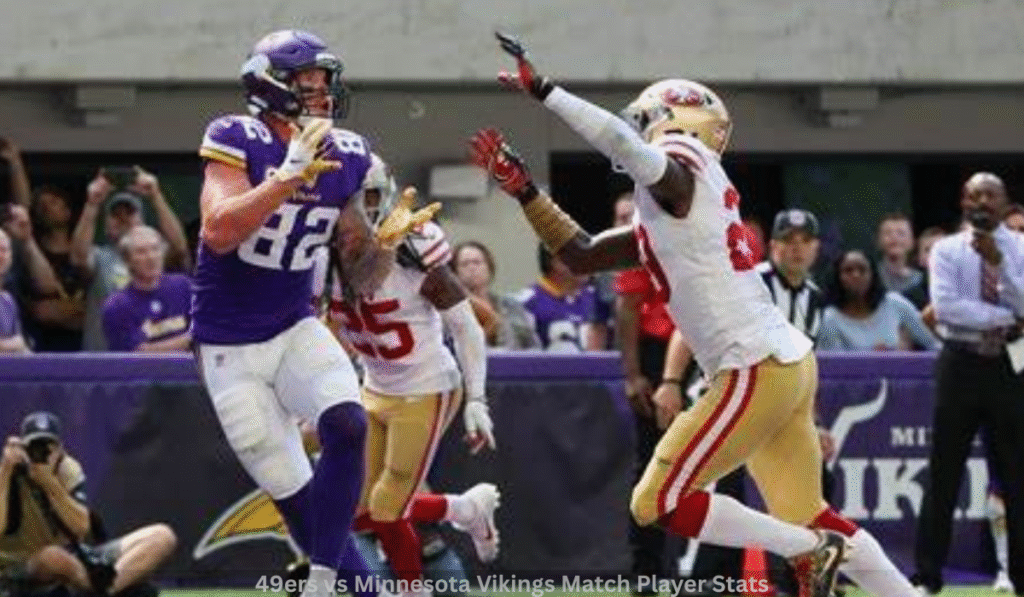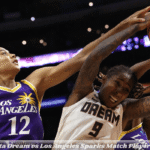The San Francisco 49ers and Minnesota Vikings faced off once during the 2024 NFL regular season, in a Week 2 showdown at U.S. Bank Stadium that featured explosive plays, defensive stands, and the narrative of former teammates clashing amid injury challenges. This article offers a thorough dissection of the game, including player stats, recap, and matchup context, sourced from verified platforms such as ESPN, Pro-Football-Reference.com, NFL.com, CBS Sports, and FOX Sports. The September 15, 2024, contest ended with the Vikings prevailing 23-17, boosting their early unbeaten run while exposing San Francisco’s vulnerabilities without key starters. Below, we delve into the game summary, individual stats, critical moments, and team dynamics.
Game Highlights
- Sport: American Football
- League: NFL (National Football League)
- Location: U.S. Bank Stadium, Minneapolis, Minnesota
- Matchup: 49ers vs Minnesota Vikings Match Player Stats
- Game Covered:
- Game: September 15, 2024 (Sunday)
- Final Score: Vikings 23, 49ers 17
Game Overview: San Francisco 49ers vs. Minnesota Vikings, September 15, 2024
The Vikings (2-0) outlasted the 49ers (1-1) 23-17 in a defensive battle at U.S. Bank Stadium, where Sam Darnold threw for 268 yards and two touchdowns against his former team, capped by a 97-yard strike to Justin Jefferson. Minnesota’s defense forced two turnovers and sacked Brock Purdy three times, while Will Reichard’s three field goals proved decisive. Jordan Mason rushed for 94 yards and a touchdown in Christian McCaffrey’s absence, but San Francisco managed just 1-of-12 on third downs and committed three turnovers. Attendance: 66,741; game time: 3:05; indoors (dome). The Vikings controlled time of possession (32:12) and outgained San Francisco 342-349 in total yards, leading 13-10 at halftime before holding off a late rally.
Game: San Francisco 49ers 17, Minnesota Vikings 23 (September 15, 2024)
Game Summary
Minnesota’s opportunistic defense and Darnold’s poise secured a 23-17 upset over the defending NFC champions, who were hampered by injuries to Christian McCaffrey (IR, Achilles/calf), Brandon Aiyuk (knee), and Trent Williams (groin). Purdy completed 25-of-37 passes for 255 yards, one touchdown (to George Kittle), and one interception, while Mason grinded out 20 carries for 94 yards and a score. Jefferson’s 97-yard touchdown reception from Darnold (his longest career play) gave Minnesota a 10-0 lead, but San Francisco clawed back to tie at 17-17 in the third before Reichard’s 22-yard field goal and a late touchdown to Joshua Ollison pushed the Vikings ahead. The 49ers’ red-zone inefficiency (two turnovers inside the 20) and 0-for-12 third downs proved fatal, despite Deebo Samuel’s 108 receiving yards. Jonathan Greenard recorded two sacks for Minnesota, and Harrison Smith’s interception set up scoring position.
Key Player Stats: San Francisco 49ers
- Brock Purdy (QB): 25-for-37 (67.6%), 255 yards, 1 TD, 1 INT, 102.7 rating, 3 sacks (-17 yards), 0 rush attempts. Purdy’s 255 yards came on 17-of-25 in the second half, including a 19-yard TD pass to Kittle, but his interception to Smith in the third stalled a drive at midfield.
- Jordan Mason (RB): 20 carries, 94 yards (4.7 avg.), 1 TD (3-yard run), 3 receptions, 10 yards, 1 fumble (lost). Mason’s 94 yards marked his second 100-yard game in as many weeks (100 vs. Jets in opener), with his third-quarter TD cutting the lead to 13-14.
- Deebo Samuel Sr. (WR): 7 receptions, 108 yards (15.4 avg.), 0 TDs, 3 carries, 10 yards. Samuel’s 108 yards were his 15th 100-yard receiving game, highlighted by a 38-yard catch setting up Mason’s TD.
- George Kittle (TE): 7 receptions, 76 yards (10.9 avg.), 1 TD (19-yard reception). Kittle’s second-quarter score tied the game at 7-7; his 76 yards pushed his career total to 6,390, third among tight ends at 100 games.
- Jauan Jennings (WR): 4 receptions, 41 yards (10.3 avg.), 0 TDs. Jennings converted third downs, including a 15-yard grab in the fourth.
- Kyle Juszczyk (FB): 2 receptions, 17 yards (8.5 avg.), 0 TDs. Juszczyk’s short catches supported the run game.
- Ricky Pearsall (WR, Rookie): 1 reception, 3 yards (3.0 avg.), 0 TDs. Pearsall’s debut 3-yard slant came in the second half.
- Nick Bosa (DE): 5 tackles (3 solo), 2 sacks (10 yards), 2 TFL, 1 FF, 1 PD. Bosa’s sacks forced a punt and three-and-out.
- Fred Warner (LB): 9 tackles (5 solo), 1 sack (5 yards), 1 TFL, 1 INT, 1 FF, 2 PD. Warner’s first-quarter INT and fourth-quarter fumble force on Jones at the 1-yard line were clutch.
- Malik Mustapha (S, Rookie): 6 tackles (4 solo), 1 PD. Mustapha’s coverage limited Jefferson post-TD.
Inactives: Christian McCaffrey (Achilles/calf, IR), Brandon Aiyuk (knee), Trent Williams (groin).
Team Stats: 47.4% pass comp. (25/37, 255 yds), 4.7 yds/rush (25 att., 117 yds), 349 total yds, 17 first downs, 1/12 3rd downs (8.3%), 5/6 4th downs, 3 turnovers, 8 penalties (65 yds), 22:48 TOP, 3 sacks allowed (-17 yds), 17 points (7 rush, 7 pass, 3 FG).
Key Player Stats: Minnesota Vikings
- Sam Darnold (QB): 17-for-26 (65.4%), 268 yards, 2 TDs, 1 INT, 121.6 rating, 3 sacks (-17 yards), 1 rush (5 yds). Darnold’s 97-yard TD to Jefferson and 17-yard score to Joshua Ollison were pivotal; his 268 yards were a season high vs. SF.
- Aaron Jones (RB): 14 carries, 93 yards (6.6 avg.), 0 TDs, 3 receptions, 21 yards, 1 fumble (lost). Jones’s 18-yard run set up a TD but fumbled at the goal line.
- Justin Jefferson (WR): 6 receptions, 138 yards (23.0 avg.), 1 TD (97-yard reception), limited by quad injury (exited third quarter). Jefferson’s 97-yard score was the game’s highlight.
- Jordan Addison (WR): 3 receptions, 54 yards (18.0 avg.), 0 TDs. Addison’s 30-yard grab set up a field goal.
- T.J. Hockenson (TE): 3 receptions, 33 yards (11.0 avg.), 0 TDs. Hockenson converted third downs.
- Joshua Ollison (TE): 2 receptions, 23 yards (11.5 avg.), 1 TD (17-yard reception). Ollison’s fourth-quarter score extended the lead to 20-7.
- Jonathan Greenard (DE): 4 tackles (3 solo), 2 sacks (12 yards), 2 TFL, 1 PD. Greenard’s pressure forced Purdy’s INT.
- Harrison Smith (S): 7 tackles (5 solo), 1 INT, 1 PD. Smith’s third-quarter INT set up a field goal.
- Byron Murphy Jr. (CB, Rookie): 5 tackles (3 solo), 1 sack (5 yards), 1 TFL, 1 PD. Murphy’s sack on Purdy in the fourth forced a punt.
Inactives: J.J. McCarthy (knee, IR).
Team Stats: 65.4% pass comp. (17/26, 268 yds), 5.2 yds/rush (22 att., 74 yds), 342 total yds, 20 first downs, 4/13 3rd downs (30.8%), 0/1 4th downs, 1 turnover, 5 penalties (45 yds), 32:12 TOP, 3 sacks (-17 yds), 23 points (14 pass, 9 FG).
Critical Moments
- First Quarter (MIN 3, SF 0): Jonathan Greenard sacked Purdy on third down, forcing a punt; Harrison Smith’s INT on Darnold’s overthrow set up a 49ers field goal attempt (missed, but no score). Reichard’s 42-yard FG capped a short drive (3-0 MIN).
- Second Quarter (MIN 13, SF 10): Darnold’s 97-yard TD bomb to Jefferson (10-0 MIN); Purdy’s 19-yard TD to Kittle tied it (7-10); Moody’s 52-yard FG knotted 10-10; Reichard’s 31-yard FG at halftime (13-10 MIN).
- Third Quarter (MIN 20, SF 17): Mason’s 3-yard TD run (13-14 MIN); Reichard’s 27-yard FG (17-14); Moody’s 40-yard FG tied 17-17; Reichard’s 22-yard FG (20-17 MIN).
- Fourth Quarter (MIN 23, SF 17): Darnold’s 17-yard TD to Ollison (20-17 MIN); Warner forced fumble on Jones at the 1-yard line; Reichard’s 31-yard FG sealed 23-17 after Purdy’s 4th-and-10 incompletion.
Head-to-Head Analysis
The 49ers entered with a 25-24-1 all-time edge over the Vikings (dating to 1953), averaging 24.5 PPG to Minnesota’s 20.8, but the 2024 meeting flipped momentum with the Vikings’ +2 turnover differential and 32:12 TOP control. Minnesota’s strengths: Darnold’s 121.6 rating and Jefferson’s YAC (yards after catch) explosiveness (97-yard TD). San Francisco’s counters: Ground control (117 rush yds) and Purdy’s second-half efficiency (17/25, 255 yds), but 1/12 third downs and three turnovers were costly. The Vikings converted 4/13 on third downs (30.8%), exploiting SF’s depleted O-line (3 sacks allowed).
Game Standouts
San Francisco 49ers
- Jordan Mason: 94 rush yards, 1 TD; seamless fill-in for McCaffrey, averaging 5.0 ypc.
- Deebo Samuel Sr.: 108 receiving yards; versatile threat with 38-yard key grab.
- Fred Warner: 9 tackles, 1 INT, 1 FF; goal-line heroics prevented two scores.
Minnesota Vikings
- Sam Darnold: 268 yards, 2 TDs; 97-yard TD to Jefferson vs. ex-team.
- Justin Jefferson: 138 yards, 1 TD; explosive despite quad exit.
- Jonathan Greenard: 2 sacks; disrupted Purdy into turnovers.
Team Performance Context
San Francisco 49ers (1-1, 1st NFC West): Injuries derailed the defending champs early, but Mason’s 94 yards and Purdy’s 255 yards showed resilience; defense forced 1 turnover but allowed 342 yards. Third-down woes (1/12) and O-line protection (3 sacks) loom large. Next: vs. Rams (1-1).
Minnesota Vikings (2-0, 1st NFC North): Unbeaten via Darnold’s revival and aggressive D (3 sacks, 1 INT); Jefferson’s 138 yards despite injury bolsters passing attack, though run game (74 yds) lagged. Next: at Bears (1-1).
Injury and Roster Notes
- San Francisco 49ers: Christian McCaffrey (Achilles/calf, IR, 6-8 weeks out); Brandon Aiyuk (knee, out); Trent Williams (groin, day-to-day). Mason emerged as RB1.
- Minnesota Vikings: Justin Jefferson (quad, day-to-day, exited third quarter); J.J. McCarthy (knee, IR). Darnold confirmed as starter.
Conclusion
The Minnesota Vikings handed the San Francisco 49ers a 23-17 defeat on September 15, 2024, with Darnold’s 268 yards and Jefferson’s 138-yard, 97-yard TD performance overcoming Purdy’s 255 yards and Mason’s 94 rushing yards. Minnesota’s defense (3 sacks, 1 INT) and Reichard’s kicking proved the difference in a low-scoring affair marred by SF injuries and inefficiency. This game signaled the Vikings’ early contender status and the 49ers’ need for depth. For full box scores and video, visit ESPN, Pro-Football-Reference.com, NFL.com, or CBS Sports.



